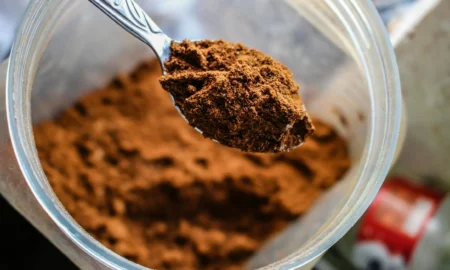Q: Your article [in the May ’09 issue] about getting bigger on a limited diet was very interesting, but how is it possible in physiological terms? Do other bodybuilders also believe this? Is there evidence, or were you just talking about your body?
A: I thought that it was just my body that reacted that way. Turns out, after we hit our late 40s to early 50s, we all have to deal with pretty much the same problems. Drug-free bodybuilder Dave Goodin told me that he never gets more than six to eight pounds away from competition weight.
Let me explain it in biological terms. Cells die by four biological aging mechanisms: excessive insulin, excessive cortisol, excessive free radicals and advanced glycosylated end products, called AGEs. Once cells begin to age, it becomes harder and harder to keep them forming muscle fibers and easier and easier to launch some nutrients into fat cells because of insulin and cortisol.
Insulin is primarily a storage hormone. You need adequate insulin in order to ensure proper feeding of your cells for muscle growth and other organic functions. Without insulin, all cells would suffer a rather quick death; however, it’s not only a growth factor but an aging factor as well, and too much of it speeds aging and brings about death more quickly than almost any other biological process.
Excess insulin is produced when target cells no longer permit insulin to store nutrients within the cell. So blood glucose remains in the blood, and a feedback signal is sent to the hypothalamus, which in turn instructs the pancreas to secrete more insulin. The affected cells become more rigid with each secretion, which means the insulin begins to lose its ability to penetrate cells and store nutrients. Glucose remains high, potentially damaging brain cells and nerves, because penetration into cells is nearly impossible. If the insulin and other hormone resistance becomes bad enough, the adrenal glands try to regulate blood glucose with cortisol. The cells remain impenetrable, soon blocking the absorption of other hormones, and cell death begins. Forget muscle mass; you could be in big trouble.
Free radicals and AGEs come from the air we breathe and the food we eat. According to scientists, air is mostly inert gassy molecules. Unless the body extracts an electron from an oxygen atom—O2—to form a free radical, it can’t react with other molecules to maintain the body’s processes. Once the electron is extracted, a free radical forms, and aerobic life can begin.
Life on Earth was anaerobic for its first 3 billion years; photosynthesis had not yet begun, and the planet’s single-celled microorganisms did not require oxygen. Only with the emergence of photosynthetic organisms approximately 3.5 to 2.75 billion years ago did oxygen begin accumulating in the atmosphere, and aerobic organisms developed to take advantage of the new oxygen-rich environment.
These early aerobic organisms devised ways to convert oxygen into water and, in due course, create energy, a concept in the background of ATP production and the forces that govern muscles during weight training. The body constantly produces ATP to provide for short bursts of energy. To make ATP, you must first produce an O2 free radical. Under normal circumstances, you have only enough ATP to last about 10 seconds before your body must make more—which requires more free-radical production. That’s why my particular way of training works to increase your capacity for producing ATP. As ATP is used—no matter how you train—lactic acid is released into the fatigued muscle, thus inhibiting its continued use. That is normal. From a biological standpoint, you should train with weights to build muscle and increase strength in short bursts of all-out effort, allowing just enough rest between sets for your body to make more ATP.
Although you need free radicals to produce ATP, approximately 6 percent of all free radicals become “rogue” free radicals. Unpaired, they begin looking for a mate and attach themselves to neighboring molecules in an effort to become whole. If the neighbor happens to be protein, DNA or fat, the new molecule in turn becomes a new free radical.
Consequently, to reduce free-radical formation and cell death, you should avoid overeating and overexercising. If cellular defense enzymes and antioxidants are not present or successfully made, the newly formed free radicals can cross-link with other free radicals to form polymerized products, which contribute to rapid cellular degeneration and aging.
AGEs are the most recently discovered of the mechanisms of aging and are responsible for the cross-linking of glucose, or carbohydrate, and protein. AGEs slow muscle recovery and have a very strong impact on aging and the development of degenerative illnesses. Anytime blood glucose is elevated, cross-linking of protein and carbohydrates is likely. That is, every time you overeat, especially high-glycemic-index carbohydrates, cross-linking occurs, thereby doubling the speed of your aging process.
So it’s best to eat the least amount of food that you can create muscle with. Every time you try to bulk up, you’re aging your cells much faster than if you were to stay on a steady diet. Muscles need protein and fuel. Hormones need good fats in small quantities, but overeating for the sake of gaining muscle, especially after you hit 40, is not only counterproductive but is downright dangerous to your health. Eat what gives you just enough energy for the workout and the day, taking in adequate protein and small amounts of monounsaturated fats. Personally, I think that’s the best way to go. IM
Editor’s note: To contact Paul Burke, write to [email protected]. Burke has a master’s degree in integrated studies from Cambridge College in Cambridge, Massachusetts. He’s been a champion bodybuilder and arm wrestler, and he’s considered a leader in the field of over-40 fitness training. You can purchase his book, Burke’s Law—a New Fitness Paradigm for the Mature Male, from Home Gym Warehouse. Call (800) 447-0008, or visit www.Home-Gym.com. His “Burke’s Law” training DVD is also now available.




















You must be logged in to post a comment Login